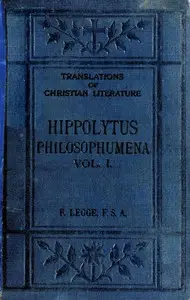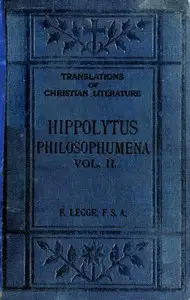"Philosophumena; or, The refutation of all heresies, Volume I" by Antipope Hippolytus is a historical examination that takes on the ambitious task of disproving the many heresies and schools of thought that popped up during the beginning of Christianity. The text looks at the core beliefs that went against the accepted Christian teachings of the time. Through examining history and philosophy, the author investigates Gnostic beliefs and rival ideologies. The book starts by laying out its goals and setting up a detailed investigation into the philosophical beliefs that shaped early heretical movements. With a special emphasis on Greek philosophers like Thales, Pythagoras, and Empedocles, the author suggests their core beliefs provided the foundation for heretical ideas. The author plans to expose and critique the theological effects of these philosophies, mixing the growth of early Christian beliefs with the major intellectual trends of the time.

Philosophumena; or, The refutation of all heresies, Volume I
By Antipope Hippolytus
Venture into the world of early Christian thought, where the author battles the philosophical underpinnings of emerging heresies.
Summary
About the AuthorHippolytus of Rome was a Bishop of Rome and one of the most important second–third centuries Christian theologians, whose provenance, identity and corpus remain elusive to scholars and historians. Suggested communities include Rome, Palestine, Egypt, Anatolia and other regions of the Middle East. The best historians of literature in the ancient church, including Eusebius of Caesarea and Jerome, openly confess they cannot name where Hippolytus the biblical commentator and theologian served in leadership. They had read his works but did not possess evidence of his community. Photios I of Constantinople describes him in his Bibliotheca as a disciple of Irenaeus, who was said to be a disciple of Polycarp, and from the context of this passage it is supposed that he suggested that Hippolytus so styled himself. This assertion is doubtful. One older theory asserts he came into conflict with the popes of his time and seems to have headed a schismatic group as a rival to the bishop of Rome, thus becoming an antipope. In this view, he opposed the Roman Popes who softened the penitential system to accommodate the large number of new pagan converts. However, he was reconciled to the Church before he died as a martyr.
Hippolytus of Rome was a Bishop of Rome and one of the most important second–third centuries Christian theologians, whose provenance, identity and corpus remain elusive to scholars and historians. Suggested communities include Rome, Palestine, Egypt, Anatolia and other regions of the Middle East. The best historians of literature in the ancient church, including Eusebius of Caesarea and Jerome, openly confess they cannot name where Hippolytus the biblical commentator and theologian served in leadership. They had read his works but did not possess evidence of his community. Photios I of Constantinople describes him in his Bibliotheca as a disciple of Irenaeus, who was said to be a disciple of Polycarp, and from the context of this passage it is supposed that he suggested that Hippolytus so styled himself. This assertion is doubtful. One older theory asserts he came into conflict with the popes of his time and seems to have headed a schismatic group as a rival to the bishop of Rome, thus becoming an antipope. In this view, he opposed the Roman Popes who softened the penitential system to accommodate the large number of new pagan converts. However, he was reconciled to the Church before he died as a martyr.














